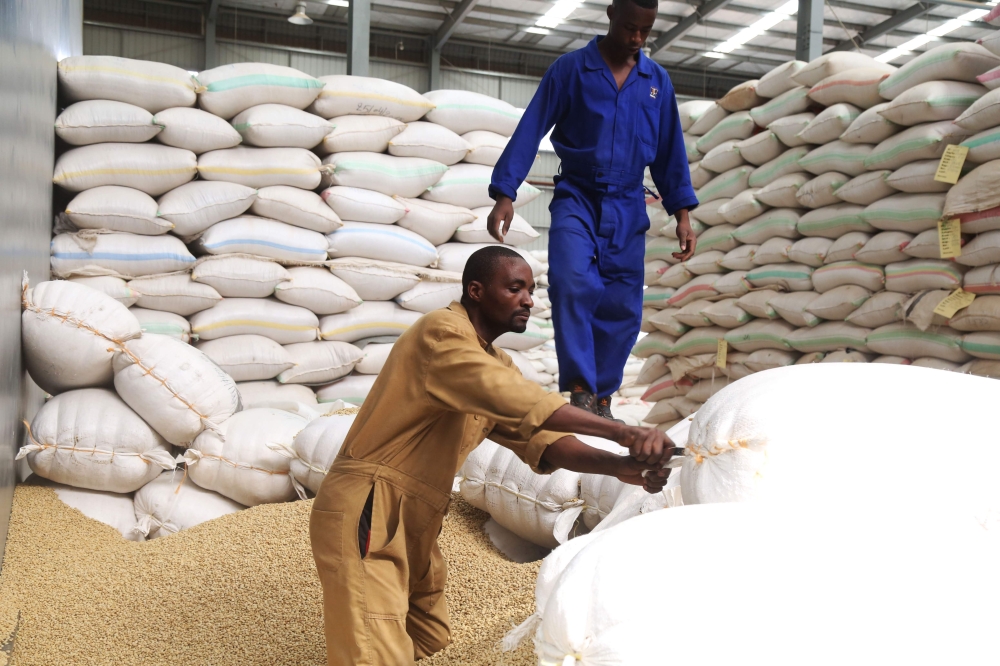

Coffee is one of Rwanda’s top agricultural exports and a significant contributor to the country’s economy. According to data from the National Agricultural Export Development Board (NAEB), Rwanda generated more than $452 million (approximately Rwf600 billion) from exporting over 113,000 tonnes of coffee between 2017 and 2023.
The figures were released by NAEB on August 13, coinciding with the launch of a two-day nationwide coffee rejuvenation campaign through Promoting Smallholder Agro-Export Competitiveness Project (PSAC).
The campaign, conducted in Karongi and Nyamasheke districts in the Western Province, and Huye and Ruhango districts in the Southern Province, aims to address the low productivity associated with aging coffee trees.
NAEB and industry stakeholders noted significant progress in Rwanda’s coffee exports over the past six years. They attributed this growth to the rise in coffee prices as the global economy recovered from the Covid-19 pandemic and the increasing recognition of Rwanda's coffee quality.
Oreste Baragahorana, Chairperson of the Coffee Exporters and Processors Association of Rwanda (CEPAR) Executive Committee, told The New Times that a new generation of educated, open-minded individuals, including youth, have entered the coffee business. Their efforts to promote Rwandan coffee in
international exhibitions across America, Europe, and Asia have bolstered the brand's popularity.
ALSO READ: How high prices buoyed Rwanda coffee exports
"That significantly boosted the specialty coffee market,” Baragahorana said, emphasizing that the increased coffee prices were a primary driver of the sector’s growth. "Coffee prices have risen consistently since the Covid-19 outbreak in 2020,” he added.
Baragahorana also highlighted the impact of increased investment in the coffee industry, particularly in processing, and efforts to encourage farmers to produce high-quality coffee.
"Coffee is a crop that must be nurtured so that everyone along the value chain can benefit,” he said.
Farmers benefit from higher coffee prices
Fulgence Sebazungu, President of the Rwanda Coffee Cooperatives' Federation (RCCF), told The New Times that farmers have seen tangible benefits from the industry's growth, particularly through increased income.
On February 11, 2022, NAEB announced a minimum price of Rwf410 per kilogram of quality coffee cherries, representing a 65 percent increase from the previous rate of Rwf248 per kilogram. Two years later, on February 12, 2024, NAEB set a new minimum price of Rwf480 per kilogram for well-ripened cherries in the 2024 season.
Sebazungu noted that while this official price remains in effect, farmers are currently selling cherries for around Rwf600 per kilogram due to competition among coffee factories and rising international market prices.
"If these prices are maintained, farmers will take even better care of their coffee trees,” Sebazungu said.
Coffee export trends
In the 2022/23 fiscal year, Rwanda exported slightly over 20,000 tonnes of coffee, generating $115.9 million—a 53 percent increase in revenue compared to the $75.5 million earned from over 15,000 tonnes sold in the previous fiscal year (2021/2022), according to NAEB data.
The average coffee price rose to $5.7 per kilogram in 2022/2023, compared to $4.9 per kilogram in 2021/2022.
During the 2020/2021 fiscal year, Rwanda exported 16,880 tonnes of coffee, generating $61.5 million with an average price of $3.64 per kilogram. In 2019/2020, the country exported 19,723 tonnes of coffee, earning $60.4 million (about Rwf57 billion).
NAEB data shows that coffee export volumes decreased by 6 percent, and revenues dropped by over 11 percent, or $7.6 million, due to the impact of the Covid-19 pandemic, which disrupted global demand.
ALSO READ: Top 10 countries consuming Rwanda’s coffee
The coffee industry also experienced a decline in prices during the 2019/2020 and 2018/2019 fiscal years.
Despite an increase in coffee export volume to 21,654 tonnes in 2018/2019 from 20,353 tonnes in 2017/2018, revenues fell to $68.7 million compared to $69.3 million the previous year, largely due to a 3.5 percent drop in global prices.
The importance of coffee tree rejuvenation
Sebazungu praised the initiative to replace aging coffee trees or rejuvenate plantations in Rwanda, emphasising its importance for increasing production.
According to NAEB, while there has been progress in coffee export earnings, about 30 percent of Rwanda’s coffee trees are over 30 years old, leading to decreased productivity. Currently, the average production is two kilograms per tree, but NAEB aims to achieve at least four kilograms per tree.
On August 13, NAEB, through the PSAC project, launched a two-day nationwide coffee rejuvenation campaign in Karongi, Nyamasheke, Huye, and Ruhango districts.
The campaign seeks to involve citizens and local leaders actively, fostering their participation, commitment, and ownership in the coffee revitalization process to ensure increased production and industry sustainability.
As NAEB points out, coffee plays a major role in Rwanda’s economy, significantly contributing to foreign exchange earnings and the monetization of the rural economy. Approximately 400,000 smallholder farm families produce coffee and depend on it for their livelihoods, according to NAEB figures.


